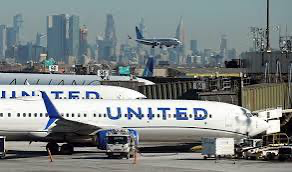Lucrative Transatlantic Flights at Risk as Trump Roils Trade
The transatlantic aviation market, a vital artery for global commerce and tourism, is currently navigating turbulent skies due to recent trade policies enacted by the Trump administration. The imposition of substantial tariffs on European aircraft and related components has introduced significant challenges for airlines, manufacturers, and passengers alike. This article delves into the multifaceted impact of these tariffs, exploring the ramifications for the aviation industry and the broader economic landscape.
The Genesis of the Trade Dispute
The roots of the current trade tensions trace back to longstanding disputes over subsidies provided to major aircraft manufacturers—Europe’s Airbus and America’s Boeing. Both parties have accused each other of receiving unfair government support, leading to a series of complaints filed with the World Trade Organization (WTO). In a landmark decision, the WTO authorized the United States to impose tariffs on $7.5 billion worth of European goods in retaliation for illegal subsidies to Airbus. This ruling paved the way for the U.S. to levy a 10% tariff on European aircraft in October 2019, which was subsequently increased to 15% in March 2020 .

Impact on Aircraft Manufacturers
The escalation of tariffs has profound implications for aircraft manufacturers on both sides of the Atlantic. Airbus, headquartered in France, faces increased costs when exporting aircraft to the U.S., a significant market for its products. The tariffs not only affect complete aircraft but also extend to parts and components, disrupting the intricate supply chains that characterize the aerospace industry. Airbus CEO Guillaume Faury has expressed concern that these tariffs could backfire, harming American workers and complicating the operations of U.S. airlines that rely on Airbus aircraft .
Conversely, Boeing, the American aerospace giant, is not insulated from the fallout. The company’s extensive reliance on international suppliers means that retaliatory tariffs from the European Union could increase production costs. Furthermore, the trade dispute threatens Boeing’s access to key markets, particularly in Europe and China, where the company has substantial business interests. Analysts suggest that Boeing may find it challenging to pass on these increased costs to customers, potentially squeezing profit margins .
Repercussions for Airlines
Airlines operating transatlantic routes are caught in the crossfire of this trade war. The increased cost of acquiring new aircraft, whether from Airbus or Boeing, is likely to be passed on to carriers, many of whom operate on thin profit margins. European airlines such as Ryanair, which has a significant number of Boeing aircraft on order, could face substantial financial strain due to potential import fees .

In the United States, carriers that utilize Airbus aircraft, including major players like American Airlines and Delta, may experience increased operational costs. These additional expenses could lead to higher ticket prices for consumers, reduced route offerings, or delays in fleet expansion plans. The interconnected nature of the aviation industry means that disruptions in aircraft supply chains can have cascading effects on airline operations and profitability.
Economic Implications for Consumers
For passengers, the most immediate impact of the tariffs is likely to be felt in the form of increased airfares. As airlines grapple with higher costs for aircraft and parts, these expenses may be transferred to consumers through ticket prices. Additionally, the potential reduction in flight frequencies or the elimination of certain routes could limit travel options, affecting both business and leisure travelers.
WSJ
Beyond airfares, the broader economic implications include potential job losses within the airline and manufacturing sectors. The aviation industry supports a vast network of ancillary services, including maintenance, catering, and logistics. Disruptions in airline operations can, therefore, have ripple effects throughout the economy, impacting employment and economic growth.
International Response and Retaliation
The European Union has signaled its intent to respond to U.S. tariffs with countermeasures of its own. French President Emmanuel Macron has urged major European companies to suspend investments in the U.S. as a form of protest against the imposed tariffs . Such retaliatory actions could further escalate the trade dispute, leading to a cycle of tit-for-tat measures that exacerbate economic tensions between the two regions.
The aerospace industry, given its global nature, is particularly vulnerable to such trade disputes. Supply chains that span multiple countries mean that tariffs can disrupt production and delivery schedules, affecting manufacturers and airlines worldwide. The potential for a protracted trade war raises concerns about long-term damage to international trade relations and the stability of the global aviation market.
Industry Calls for Resolution
Stakeholders across the aviation industry are calling for a swift resolution to the trade dispute. Both Airbus and Boeing have advocated for negotiated settlements to avoid further escalation and to protect the industry from additional harm. The Aerospace Industries Association, representing American aerospace manufacturers, has emphasized the importance of maintaining robust civil aviation and defense trade relationships, highlighting the sector’s significant contribution to the U.S. economy .
POLITICO
The General Aviation Manufacturers Association has also voiced concerns about the impact of tariffs on the complex global supply chains that characterize the aviation industry. Disruptions to these supply chains can have long-term consequences, affecting not only manufacturers but also the myriad of suppliers and service providers that depend on the industry.
POLITICO
Conclusion
The imposition of tariffs on European aircraft and components by the Trump administration has set off a chain reaction affecting manufacturers, airlines, and consumers. The transatlantic aviation market, once a symbol of international cooperation and economic integration, now faces uncertainty and potential contraction. As both sides contemplate further retaliatory measures, the need for diplomatic engagement and negotiated solutions becomes increasingly urgent. The resolution of this dispute is critical not only for the health of the aviation industry but also for the broader goal of fostering stable and mutually beneficial international trade relationships.





